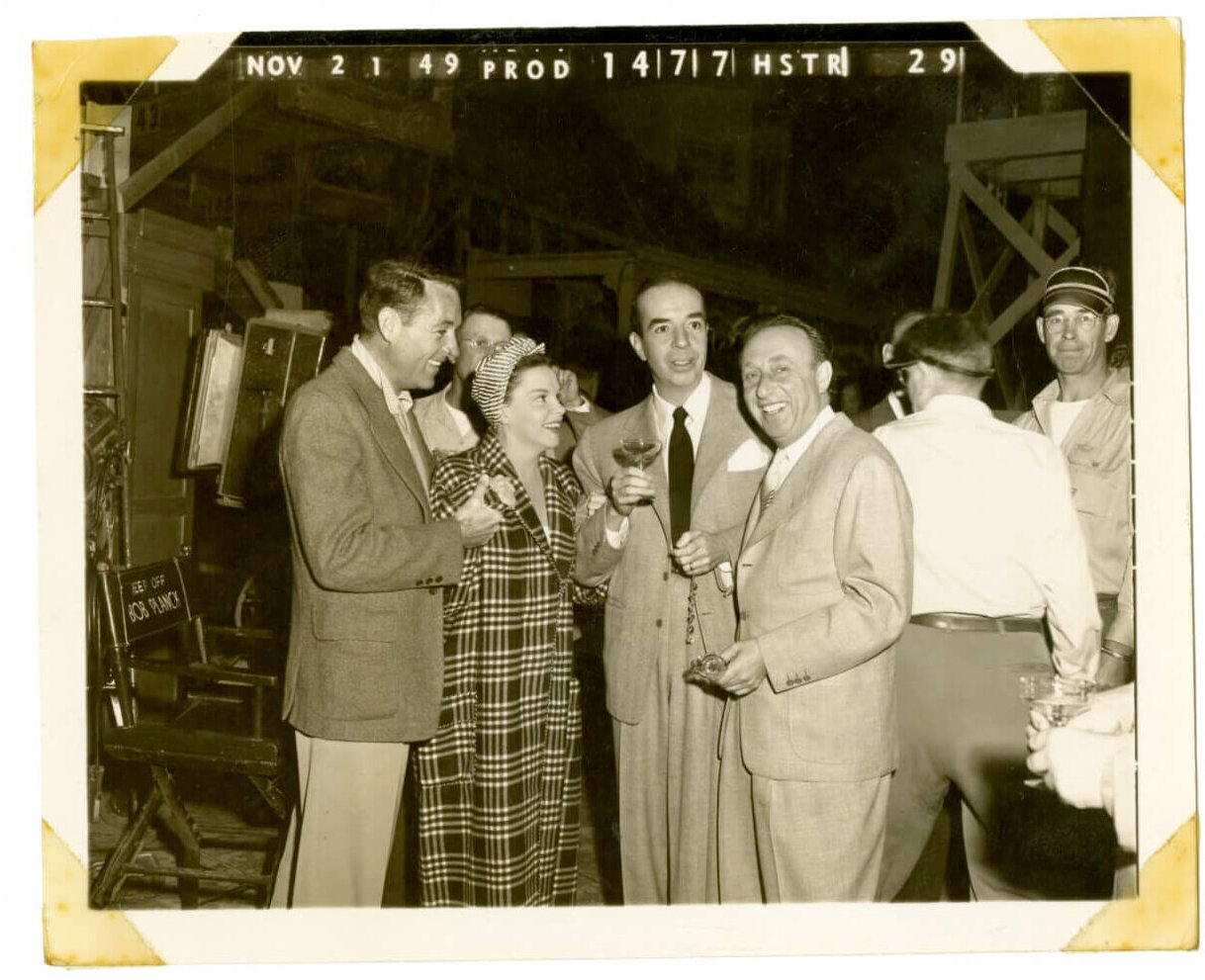How a Jewish producer — haunted by the Holocaust — gave us Judy Garland’s MGM swan song
Joe Pasternak placed a premium on happy endings. He knew life didn’t always work out that way.

Graphic by Angelie Zaslavsky
In this excerpt from their new book C’mon, Get Happy: The Making of Summer Stock (University Press of Mississippi) authors David Fantle and Tom Johnson uncover for the first-time the real reasons behind producer Joe Pasternak’s “happy ending” movie musicals and the working relationship he had with Summer Stock stars Judy Garland and Gene Kelly. Summer Stock would prove to be Garland’s final film at MGM after 15 years at the studio. The book tells of the troubled backstory of completing this production, due in part to Garland’s growing dependency on prescription medications and her faltering marriage to director Vincente Minnelli.
The man responsible for delivering more than his fair share of airy musical frolics during the Golden Age of the Hollywood musical, including the 1950 MGM film Summer Stock, to a public eager to escape (if only for 100 minutes or so) the hardships of the Great Depression and later the horrors of World War II, was producer Joe Pasternak. “My father’s mantra was, forget your troubles, despite enduring his own share of personal hardships,” said his son Jeff Pasternak. “In many ways, the lyrics to the song, ‘Get Happy’ (performed by Judy Garland in Summer Stock) embodies much of the storylines in his film work.”
Born József Paszternák, Sept. 19, 1901 in the Hungarian town of Szilagy-Smolyo, Pasternak, whose boyhood dream he once said, “was to have my own bathroom,” never answered to Joseph or the more European pronunciation of his name. To his friends, family, colleagues and the public at large, he was just plain old Joe. About that bit of down-to-earth informality, he exclaimed in a 1980 interview, “I did it, before Jimmy Carter did!”
As a producer in Hollywood, Pasternak discovered or popularized such stars as Deanna Durbin, Esther Williams, Margaret O’Brien, Van Johnson, Kathryn Grayson and Mario Lanza, and inserted into his films classical musicians such as Leopold Stokowski (One Hundred Men and a Girl), Lauritz Melchoir (Thrill of a Romance) and Jose Iturbi (Anchors Aweigh) by way of protracted musical numbers, thus delivering some “highbrow culture” to the bourgeois masses that comprised most of the audiences for his movies.
Pasternak, who emigrated to the U.S. in 1921, started – literally – from the ground up in the motion picture industry, mopping floors and washing dishes in the commissary at Paramount’s Astoria, New York studios before becoming a waiter, actor, 4th assistant director and finally an assistant to director Allan Dwan in 1923. Beginning in 1928, he worked for eight years in Europe making films for Universal Pictures, first in Berlin, then in Vienna, and finally in Budapest. With the Nazi scourge looming large in the mid-30s, Pasternak, a Jew, knew it was time to leave his native Hungary and return to America. In fact, he took pride in the fact that Hitler had erased his screen credit from all his pictures exhibiting in Germany. Pasternak pleaded with his father, sister and other family members to leave Hungary but it was futile; he returned to the states alone, knowing that he would never see his family again.
From May 15 to July 9, 1944, the Hungarian gendarmerie, under the guidance of German SS officials, deported around 440,000 Jews from Hungary. Most were directed to Auschwitz-Birkenau, where, upon arrival and after selection, SS functionaries killed the majority of them in gas chambers. Thirty-one Hungarians with the last name of Pasternak (Joe’s family certainly among them) were murdered at Auschwitz during that time. “He (Pasternak’s father), my sister Helen, her husband, their six young children, and some 40 relatives of mine, as well as my old teacher, Schwarz, were taken by the Germans during the war and destroyed in their murder camps,” Pasternak said. “I’m sure my father’s last words, as were those of another great Jew, a plea for forgiveness of his tormentors. He was that kind of man.”
Pasternak was married to the actress Dorothy Darrell from 1941 until his death in 1991 and had three sons. “He left everything at the studio,” said son Jeff. “By the time he did come home, he’d perhaps pour a martini, play a little gin rummy with a friend like Jose Iturbi, listen to the horse races and then go to bed. As a father, he was rarely effusive and played his cards close to his vest.” The Hungarian expatriate with an accent thick as goulash liked to cook the real thing made with hotdogs. In 1966, he published a book of his favorite old-world recipes, Cooking with Love and Paprika.
On the face of it, Summer Stock is pure Joe Pasternak—a cheery, gemütlich affair with the kind of simple plot that wouldn’t overly tax the gray matter of audiences, much less the screenwriters who concocted it—a troupe of uppity New York City actors invade a Connecticut farmstead to stage their show, which they hope is destined for Broadway.
Gene Kelly had enjoyed a successful collaboration with producer Joe Pasternak making the box-office hit Anchors Aweigh in 1945, and “had no wish to make waves with a powerful producer at Metro who was close to Mayer (studio head Louis B. Mayer), but he resolved now to be firm and decline the role. He tried to talk Pasternak away from choosing him for Summer Stock but, for the producer, casting Gene made good sense.”
Pasternak was charged with bringing the film in on time and on budget. According to a Garland biographer, even he, usually a softie, eternally upbeat and an ardent supporter of Garland, began to have misgivings about her ability to complete the film at one point suggesting to Mayer that the studio might want to consider cutting its losses and closing down production. Mayer would hear nothing of it. “Sit down,” he (Mayer) said. “This little girl has been so wonderful. She’s made us a lot of money, and she’s in trouble. We’ve got to help her. If you stop production now, it will finish her.” In his autobiography, Pasternak wrote, “Never once did I hear a cross word, a tart comment, a bitter crack, on the part of any member of the crew or the cast. They all understood. Gene Kelly rates a special word. Gene said: ‘I’ll do anything for this girl, Joe. If I have to come here and sit and wait for a year, I’d do it for her. That’s the way I feel about her.’
Toward the end of his life (Pasternak died in 1991 at the age of 89, six days before his 90th birthday) with his speech greatly impaired by Parkinson’s, the producer betrayed some regret when he told his son, “’If I could do it all over again, I would do things differently.’ He wanted me to know that. Who knew exactly what he was referring to, but it was a big thing for him to admit. I once asked him, ‘Dad, why don’t you make a more serious movie?’ He never really had an answer. He just wanted people walking out of the theater feeling good because so much joy was taken away from him. When I bought a Volkswagen, he was furious! He always carried a heavy heart due to the Holocaust.”
Excerpt from C’mon, Get Happy: The Making of Summer Stock by David Fantle and Tom Johnson. Copyright © 2023 by University Press of Mississippi. All rights reserved.
















